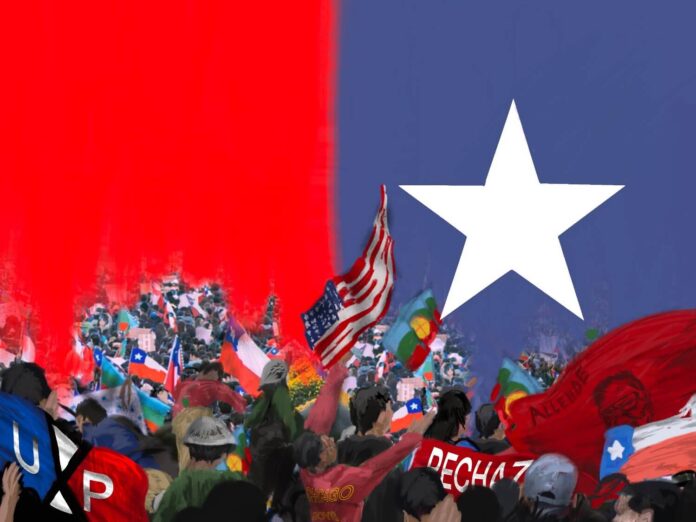On Sept. 4, 2022, the people of Chile voted on the proposed constitution, the Constitución Política de la República de Chile, with an overwhelming majority responding with rejection. The Political Constitution was to replace the 1980 Constitution, which was written to serve the interests of Augusto Pinochet‘s military dictatorship and its vision of a neoliberal economy guided by conservative social agenda.
The referendum, the product of a tremendously active half-decade in Chile, is a shocking reversal of the massive social momentum in the country since the Estallido Social, the vote for a new constitution and the historic election of the left-wing President Gabriel Boric.
The Constitution, described by some as the most progressive in the world, could have provided the foundation for dismantling Chile’s neoliberal economic system, providing various amendments for gender equality, worker rights, abortion and indigenous people’s rights, as well as numerous environmental protections. This has led some to describe it as an “ecological constitution.” With 388 articles, the Constitution would have had the world’s most expansive set of social and political rights, more than any other constitutional document. However, the referendum results showed an overwhelming rejection of the constitution by a 62 percent margin. Some understanding of Chilean history and the current political climate is needed.
Like much of Spanish-speaking South America, Chile has a long and complicated history. However, our story begins with the 1970 election of South America’s first socialist president, Salvador Allende. Allende, running with a left-radical-liberal coalition Popular Unity, won a popular mandate and worked on implementing a wealth redistribution program, promoting civil rights and nationalizing Chile’s robust mining sector. Allende’s presidency, already profoundly unpopular amongst conservative and elite forces within the nation, gained further ire from a hawkish, anti-Communist United States.
On Sept. 1, 1973, anti-Allende sections of the military under the command of future dictator Augusto Pinochet, with assistance from the CIA, underthrew the president and democracy for the next few decades in Chile. The Pinochet years, characterized by the neoliberal program of the “Chicago Boys” — laissez-faire economists influenced by the theories of Milton Friedman — and brutal repression, remain deep wounds on the national consciousness to the present day.
In 1990, Pinochet stepped down from power after a 1988 plebiscite with a 56 percent result against continued military rule. Chilean Democracy from the 1990s to 2019 was dominated by the Christian Democrats and Socialist Party. At that time, Chile had more than one political party. Yet, the 1980 constitution was used to resist popular changes from being implemented, protecting the influential private sector and ultimately allowing the dictatorial past to dominate the present.
In 2019, a series of widespread protests representing a broad coalition of students, indigenous peoples, workers and feminists against the austerity measures of billionaire President Sebastián Piñera’s government would take place after a rise in transportation fares. The protests forced a referendum on the old constitution, leading to 80 percent of voters rejecting it in October 2020. In May 2021, Chileans voted for a progressive collection of representatives for the Constitutional Convention, the body responsible for writing the new charter. Then in late 2021, in a significant rebuke of the right-wing government of Piñera, Chileans voted for outsider Gabriel Boric, a left-wing candidate from the student protest movement against the far-right José Antonio Kast.
In the last few years, Chile has been simultaneously rocked by massive social and economic instability and incredibly dynamic political change, the overriding two factors which would influence the reject vote. The reject campaign, called the Rechazo (“reject” in Spanish) campaign centered around a core of conservative and powerful political interests. Rechazo used fearmongering and fake narratives about the contents of the constitution to mislead wary Chileans into embracing the reject vote. It should also be noted that the Rechazo far outpaced the Apruebo (“approve” in Spanish) in terms of spending by 200 percent. Much of this money came from the corporations and the same interests which rallied around the overthrow of Chilean democracy. To this day, mining remains one of the primary engines of Chile’s economy, making up more than 12 percent of GDP in 2020. These factors, along with the pandemic, a low-level conflict with the Mapuche — Chile’s largest indigenous group — and the early challenges of the Boric presidency, led Chileans to hesitate on change.
However, this story has an incredible silver lining. The Constitution of 1980 is never coming back, and there is the guarantee that a far more progressive constitution will come. For a nation that only legalized divorce in 2004, the political constitution was a testament to the speed and power of ambitious social movements. Their history in Chile — whether during the Allende years, the underground left during the Pinochet, or the contemporary social movements that produced the political constitutions — remain a personal inspiration. Allende, in particular, remained committed to his vision of democratic socialism while fighting against forces far larger than himself or Chile. His martyrdom is one of the many heroic battles that characterized the 20th century. The final question for Boric and his coalition should be, after such a seemingly decisive setback, how do we land gracefully on our feet and learn from our defeats?
![]()































